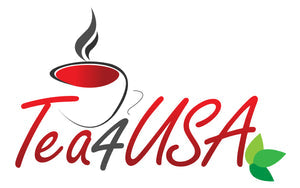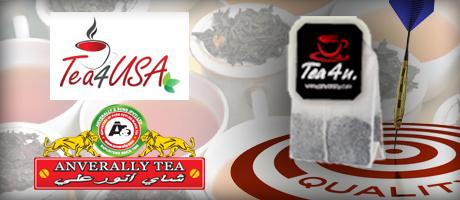Embark on a journey through the complexities of the tea supply chain with Tea4usa, where challenges abound and innovation seeks to thrive.
Quality Control
In the tea supply chain, quality control is crucial. Consistency in taste, aroma, and appearance is key from sourcing to packaging. Rigorous inspection and advanced testing facilities are necessary to meet consumer standards.
The global tea supply chain brings quality control challenges due to diverse flavor profiles from various regions, requiring expertise to cater to worldwide preferences. Tea4usa is proud to be located in the heart of Massachusetts, representing the distinct market of the United States. Anverally's model of partnering with local distributors ensures that the most appropriate tea gets to the correct consumers.
Safeguarding tea supply chain quality requires combining tradition with innovation. Anverally & Sons blend 130 years of heritage with modern processing and packaging for efficiency and consistency. Embracing terroir nuances and sustainable practices elevates the tea experience.
The quality control in the tea supply chain goes beyond taste and appearance to include ethical considerations. Supporting fair trade, transparent sourcing, and ethical labor are crucial for sustainability. Partnering with ethical producers and community initiatives helps navigate ethical quality control effectively. We are proud to make the effort to work with partners of only the highest ethical standards.
Embracing innovation in quality control processes is crucial for overcoming tea supply chain challenges. Using blockchain for traceability, AI for quality assessments, and data analytics for predictive maintenance helps enhance product integrity and meet quality standards. This approach enables Anverally & Sons to address quality control challenges proactively by integrating technology and fostering a culture of continuous improvement.
Sustainability Issues
Within the landscape of the tea supply chain, sustainability issues loom large, necessitating a holistic approach to environmental stewardship and social responsibility. Balancing the preservation of delicate ecosystems with the increasing demand for tea production poses a significant challenge to the Sri Lankan countryside. Implementing eco-friendly farming practices, minimizing chemical inputs, and promoting biodiversity are crucial steps toward mitigating the environmental impact of tea cultivation.
The ethical dimensions of sustainability in the tea supply chain involve empowering workers with fair wages, education, and healthcare for a sustainable workforce and community growth. Collaboration with NGOs and industry stakeholders is vital for addressing social inequality and promoting inclusive growth in the supply chain.
Adopting circular economy principles is key for tea supply chain sustainability. Circularity minimizes environmental impact and maximizes efficiency, focusing on waste management, resource utilization, and renewable energy sources. Tea producers can create long-term value and preserve natural resources by reimagining supply chain practices with sustainability in mind.
The quest for sustainability in the tea supply chain is closely linked to consumer expectations for ethically sourced and environmentally conscious products. Transparent communication about sustainability initiatives, certifications, and impact metrics builds consumer trust and loyalty. Investing in sustainable packaging, ethical sourcing, and community development projects demonstrates a commitment to sustainability that appeals to conscientious tea enthusiasts.
Embracing innovation and collaboration is vital for overcoming sustainability challenges in the tea supply chain. By implementing regenerative agriculture and carbon-neutral manufacturing, the industry can lead in sustainability. Building a culture of sustainability and forming partnerships can drive environmental and social responsibility.
Logistics Challenges
Navigating the complex tea supply chain involves challenges like sourcing raw materials, coordinating shipping, and managing inventory. Timely delivery and cost optimization are crucial for tea businesses' success.
The tea supply chain faces challenges like seasonality, market changes, and regulations. Managing inventory, optimizing routes, and complying with rules are ongoing tasks for logistics managers, not to mention the unpredtability of the safety of sea routes due to pirates. Using digital tools like predictive analytics, IoT tracking, and cloud inventory systems can improve tea logistics.
Effective collaboration and communication are crucial for overcoming tea supply chain challenges. Establishing partnerships with suppliers, carriers, and logistics providers builds trust and accountability. Agile practices like route optimization and demand forecasting help tea companies adapt to market changes efficiently.
Harnessing digital transformation and data-driven insights revolutionizes tea logistics with technologies like blockchain, AI, and RFID. Embracing innovation streamlines processes, optimizes resources, and mitigates challenges effectively.
Market Competition
In the competitive tea industry, companies must differentiate themselves through brand identity, packaging storytelling, and digital marketing to attract and retain customers.
The globalization of the tea supply chain increases market competition. Understanding cultural nuances, consumer preferences, and regional trends is crucial for tailoring products and marketing strategies. Market research, competitor analysis, and brand positioning are key for success. Making sure that the right product is in the right market is crucial.
Innovation emerges as a catalyst for differentiation and growth in the fiercely competitive tea supply chain ecosystem. Introducing novel tea blends, functional infusions, and sustainable packaging solutions without impacting quality resonates with modern consumers seeking unique experiences and ethical choices. Collaborating with renowned chefs, wellness experts, or influencers to create signature tea blends and engaging in experiential marketing campaigns cultivates brand loyalty and reinforces market positioning.
Agility and responsiveness are paramount qualities in overcoming market competition challenges within the tea supply chain. Adapting swiftly to changing consumer preferences, market trends, and competitive landscapes enables tea companies to seize opportunities and mitigate threats effectively. By fostering a culture of innovation, customer-centricity, and adaptability, businesses can navigate the complexities of the market and carve a distinctive niche in the ever-evolving tea industry.
Embracing digital transformation and e-commerce opens new avenues for tea companies to expand their reach and engage with consumers in the competitive tea supply chain arena. Developing personalized marketing strategies, leveraging social media platforms for brand promotion, and enhancing online shopping experiences cater to the evolving preferences of tech-savvy tea enthusiasts. By harnessing the power of digital tools and analytics, tea brands can optimize our market presence and drive sustainable growth. We at Tea4usa hope that you will join with us for your tea needs.
Navigating the Future of Tea Supply Chain
The tea supply chain embodies a delicate balance between tradition and modernity, presenting opportunities for growth and sustainability. Tea4usa and Anverally & Sons embody both tradition and innovation.
Happy brewing,
Jane

